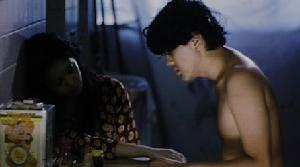
Mee Pok Man (Eric Khoo, 1995)
Eric Khoo is credited for reviving Singaporean cinema with his first feature film, Mee Pok Man. The funny thing is Khoo isn't really satisfied with just reviving what was supposedly dead for almost two decades. He just had to stretch the limits of the Singaporean government's strict censoring body, and gratuitiously adds snippets that would most certainly raise the eyebrows of the censors. Mee Pok Man begins with a montage of fastly cut images of the dirt, the grime, the Singapore media wouldn't dare show us. Interspersed between the images of the neon lights of the red light district of the city-state, trashcans, meat, and food are pictures of a single nipple, a resting butt, and a female's pubic hair area. Just for that thirty seconds of bravery against a government that punishes gum-chewing and sidewalk spitting with lashes of bamboo canes, Khoo deserves all my praise.
Mee Pok Man, without the courageous opening montage, is quite intriguing. A mee pok (a noodle dish served with soup and fish balls) vendor (Joe Ng) is enchanted by street hooker Bunny (Michelle Goh), who usually spends the night at the food stall with her co-workers, where their pimp Mike Kor (Kay Tong Lim) will eventually pick them up and bring them to their booked engagements. One night, Bunny is bumped by a car and is rescued by the street food vendor and brought and taken care of in his place, resulting in a quiet and terminated romantic relationship that forces the morose vendor to open up and release his pent-up angst.
Perhaps the most fascinating thing about Mee Pok Man is that it sort of tried to pierce the mythology that there are no poor people in Singapore, one of the richest cities in the world. Khoo's painting of Singapore's more impoverished districts is very much like that of crowded Hong Kong, or Bangkok where citizens live in unadorned tenements, and survive and eat at street food places. Khoo's characters are pitiful --- these are the Singaporeans who got left behind, the sad, forgotten ones. These are the citizens who didn't meet the requirements of success and are left to sell their bodies, or their food products, or steal, or rely on debts, or share in a collective hope of being something more than they are. This is the focus of Mee Pok Man, where dreams and ambitions of a better life are caged up in a society that takes pride in rigid rules of excellence, and that unless you catch up with everyone, you are left in the trash bin with other rejects.
Khoo's unflinching commentary of the almost inhumane rigid societal norms that have lead Singapore to success is subtly inputted in the mee pok vendor and Bunny's unaccomplished love affair. Bunny is a dreamer who hopes that her British photographer boyfriend will bring her to London. When her brother discovers her diary, we become aware of Bunny as a human being whose dreams and ambitions are carried over since her school days. The vendor on the other hand is a recluse. He barely speaks, but when he does, it is with wary satisfaction of the fact that this is only what he can do --- to cook noodles, and the only other thing he can aspire for, is not money, material things, or traveling the world, but love. When Bunny dies, he doesn't forgo of that accomplished goal and in a disturbing yet interestingly passionate way, nurtures that one night of human connection beyond death. It's a tragic consequence of being forgotten and kept secret: that notions of goal and ambition take form in a queer and almost unnatural form, but still distinctly very human.
0 comments:
Post a Comment